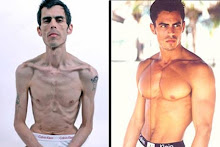"Study: Hunger hormone works by making food look more appealing"
by HELEN BRANSWELL, The Canadian Press
"TORONTO — A hormone produced in the gut spurs people to eat more by making food look more appealing, new research reveals.
The study, by researchers with McGill University’s Montreal Neurological Institute, shows that the hormone, ghrelin, activates parts of the brain involved in sensations of pleasure or reward.
"Ghrelin is a gut signal — it’s the way the gut communicates with the brain to make you hungry," explained Dr. Alain Dagher, a neurologist who studies the workings of the brain in drug addiction.
"And how it does that is by increasing the rewarding nature of food cues, by making food pictures or food thoughts or food objects more attractive to you. And therefore increasing the probability that you will eat."
The system is probably an evolutionary holdover from the time when food was scarce and getting it came at a physical cost, Dagher suggested. In order to survive as a species, our ancestors had to view expending the energy to secure food as more compelling than the impulse to conserve energy.
"So our brain evolved to make us have this extremely powerful drive to eat. And ghrelin is one of the signals — it may be one of the most potent signals — in that drive to eat," he explained.
The study, published in the journal Cell Metabolism, involved giving injections of ghrelin or a placebo to volunteers three hours after they’d eaten a standardized meal. (Ghrelin levels spike when we are hungry and subside after we’ve eaten.)
The trial subjects were then shown pictures — some of different foods, some of scenery — while their brains were being scanned using magnetic resonance imaging, or MRIs.
When those who had received the ghrelin were looking at the food pictures, the MRIs showed the portions of their brains known to be involved in pleasure — the so-called reward centres — lit up, signalling they were activated.
That pattern of brain activation was not seen when they were looking at the pictures of scenery or when the people who received the placebo injection — saline solution — viewed the food pictures.
In addition, parts of the brain involved in vision were more active when the volunteers who got the ghrelin injection looked at the pictures of food, suggesting they were actually processing the visual information better. They later remembered the food pictures better as well.
The reward centres activated in the experiment are also known to be involved in drug addiction. That suggests it’s reasonable to believe that high-calorie food might have greater appeal — and greater addictive potential — than lower-calorie alternatives, Dagher said, though he hastened to say this study doesn’t prove that.
In fact, the researchers did not try to measure in this work whether burgers and pizza — a couple of their pictured foods — triggered greater brain activity than did salads, which were also shown.
They did find, though, that while all those who got the ghrelin injection responded, the level of response differed among the individuals.
That underscores the complexity of the system — and the challenge of trying to use the information to find ways to modify eating impulses, said Dr. Diane Finegood, scientific director of the Canadian Institutes of Health Research’s Institute of Nutrition, Metabolism and Diabetes."
LINKS:
http://lfpress.ca/newsstand/News/National/2008/05/07/5494046-sun.html
http://www.thechronicleherald.ca/Search/1054284.html
Follow on Buzz






























5 comments:
"So our brain evolved to make us have this extremely powerful drive to eat. And ghrelin is one of the signals — it may be one of the most potent signals — in that drive to eat," he explained.
Wow! Great post, Medusa. Very interesting. Hope you don't mind, I've linked to it on my blog.
My blog: Weighing The Facts
MrsM, thanks so much for the link!
Really appreciate it: ^)
As a devout Globalcoolingist a.k.a. intelligent person :D here's my theory -- ok so it's not *my* theory but hey it's a theory & I like it -- we're already wading into the shallow water of the next Ice Age, and what some soon-to-become instinct representatives of our species are calling "the obesity epididemic" is in fact the evidence of our primal "body wisdom" -- instinctively preparating us for the Big Chill by optimizing the amount of insulation/fuel a.k.a. stored bodyfat.
Long story short -- our craving for pizza & donuts means we're gonna outlive the supermodels.
That's my story & I'm stickin' to it :D
Low carb eating decreases ghrelin, whereas low fat eating increases ghrelin.
You always post the best info! I heart you, Ms. Medusa....and I would never confuse your hair (do) with another with dreds. We all know "dreds" have a life all their own.....yes, yes and yes...carry on fellow message board divas....You are way more in the loop, than I will ever be.......
Post a Comment